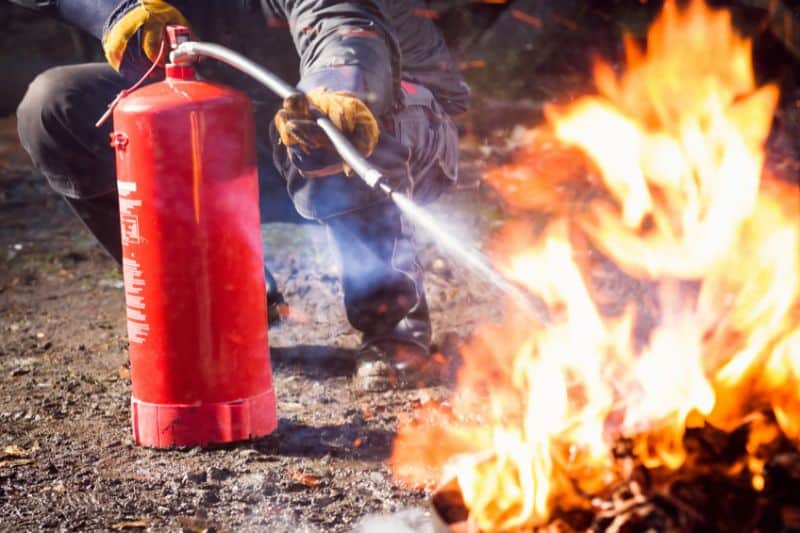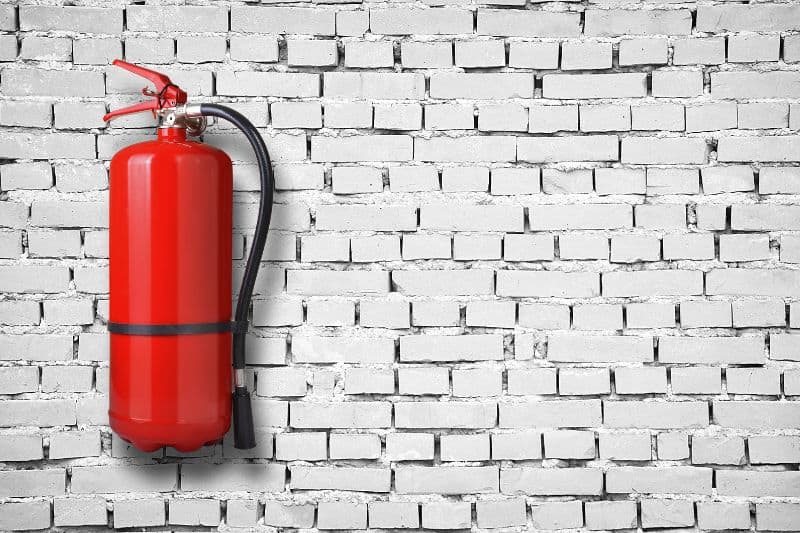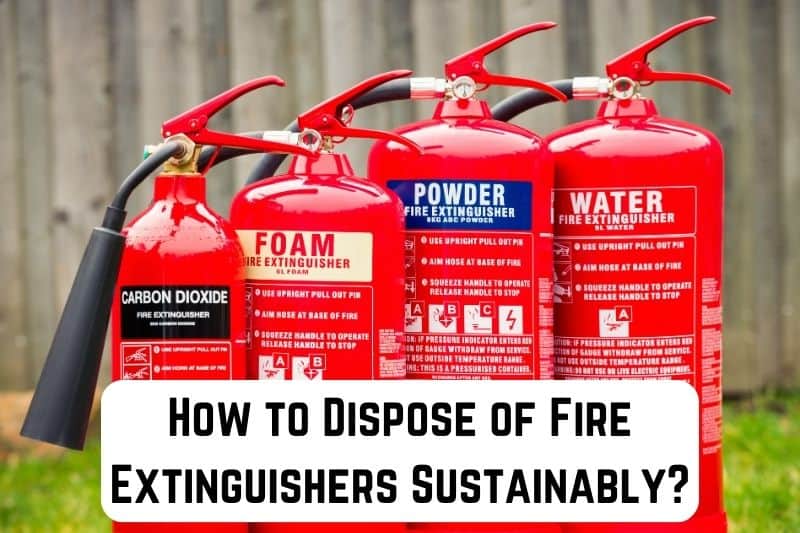A fire extinguisher is a portable handheld cylindrical container with fire-fighting agents dispersed under pressure. Apart from the regulations that mandate their availability in many places, those portable cylindrical objects have been life savers for so long. You can use it to fight a small fire and put it out before it becomes bigger.
Fire extinguishers are vital to almost every place. From homes to commercial buildings, schools and educational institutions, healthcare facilities, restaurants, retail stores, vehicles, and construction places, to mention but a few. Fire extinguishers can be seen anywhere fire can break out, which is everywhere!
Read: Can You Recycle Fire Extinguishers?
Let’s examine the specifics of handling and properly disposing of fire extinguishers.
Signs to Replace Your Fire Extinguisher
It is vital to not only have a fire extinguisher around and a good fire extinguisher that can perform its functions. Therefore, you should replace a fire extinguisher if it is old, damaged, hasn’t the best pressure, or has been used.
A fire extinguisher is the first aid of fire-fighting. A fire extinguisher that does its job well can prevent the catastrophe of a destructive fire. Therefore, you should learn what can cause a fire extinguisher to be unable to perform its duty.
Expiration
You should replace your fire extinguisher if it has exceeded its expiration date. Expiration dates communicate the manufacturer’s intent on when the fire extinguisher may no longer be good.
Using a fire extinguisher after its manufacturer date may be ineffective because it would have lost some of its properties over time. Also, the chemical might have settled, preventing it from discharging and working as it should.
Damaged Container
A damaged container might have caused damage to the fire extinguisher itself, making it ineffective and dangerous. For instance, blocked nozzles can prevent proper extinguisher discharge, causing problems with the use.
Also, a broken seal may indicate tampering or lack of proper maintenance. It might also have allowed some parts of the extinguisher to escape, making it as unreliable as it should be.
Moreover, a faded or illegible label can make it hard to see and read crucial information about the fire extinguisher. This can cause problems like wrong storage and use, not knowing the expiration date, and inability to follow instructions.
Low Pressure
Pressure is an important aspect of using a fire extinguisher to combat fire. It affects the range, discharge power, response, and coverage. Therefore, you should replace your fire extinguisher when the pressure is low. Low pressure can lead to reduced extinguishing power and delayed response.
Also, you can experience a low discharge range, which can be dangerous as you must not go too near the fire. A large range is the best way to properly extinguish the fire without compromising your safety. Lastly, an extinguisher with low pressure can cause safety concerns as it cannot adequately cover fires that spread rapidly.
Frequent Use
Most fire extinguishers are meant for a one-time use. Therefore, they may not be functional again after using them for the first time. Although there are refillable or rechargeable fire extinguishers, you must refill them after each use.
Multiple uses can lead to leaks, cause inadequate content, and expulsion of some particles in the extinguisher. Therefore, you should check the manufacturer’s instructions on the use and content and replace fire extinguishers adequately.

Various Ways to Dispose of Fire Extinguishers
Disposing of a fire extinguisher wrongly can cause harm to the environment and human health, so it is important to learn proper, safe, and eco-friendly disposal.
People dispose of fire extinguishers in many ways. However, not all the methods are great. Some methods can lead to dangers like pollution, causing landfills, and even fire problems. Therefore, knowing and practicing safe fire extinguisher disposal methods is important.
Contact Your Local Fire Department
Fire departments and organizations related to fire control have adequate knowledge of fire control equipment, including extinguishers. Therefore, your local fire department is your first point of getting the correct disposal for your fire extinguishers.
Contact them for information and education regarding the proper protocol for maintaining and disposing of your fire extinguishers. Also, they may help you verify if you can recycle the extinguisher, and some offer collection services.
Donate, Repurpose, Or Recycle
Another thing to do is donate the fire extinguisher. You can only donate a fire extinguisher that is still in good condition. You can give it to an organization or the fire department for fire training exercises.
If the extinguisher is exhausted, you can consider repurposing or recycling the metal container. You can use the container as a plant holder, lamp base, furniture base, storage container, etc.
Return To The Manufacturer Or Retailer
Some fire extinguisher manufacturers have recall or take-back programs. They use this program to monitor fire extinguisher uses and disposal, making them control it and prevent hazardous disposal.
You can check any manufacturer’s take-back program around you and inquire if they can take the extinguisher you want to dispose of.
Use Hazardous Waste Collection Service
Hazardous waste collection services deal with dangerous wastes, ensuring proper disposal and recycling. Therefore, when considered a waste, they are the best option for handling a fire extinguisher.
Contact the hazardous waste commission around you to take possession of the fire extinguisher. You can also look for hazardous waste collection events to take it to.
Why Can’t you Throw Away the Extinguisher in the Trash?
It is wrong to throw an extinguisher into the trash, as it can cause pollution, harm, and health issues.
It is a bad and dangerous means of disposing of fire extinguishers and remnants. This is because fire extinguishers can contain hazardous materials that can enter the home or other enclosed spaces through the trash. This can pollute the home and cause health issues when inhaled.
Also, manufacturers make fire extinguisher containers from strong metals. This means they cannot degenerate or decompose. Putting them in the trash and eventually disposing them in landfills can cause persistent environmental problems. The residual chemicals can lead onto the land, polluting the soil and the groundwater.
Are Fire Extinguishers Flammable?
No, fire extinguishers are not flammable. Fire extinguishers are made from non-flammable materials to combat fire by depriving it of essential elements for combustion like oxygen, fuel, or heat.
Fire extinguishers are made from non-flammable materials like carbon dioxide, water, foam, halon, and dry chemicals. Therefore, you should not worry about your fire extinguisher catching or igniting fire.
Instead, ensure you observe safety precautions when using it to prevent inhaling toxic properties from the extinguisher. Check for a clear path for your exit when using Extinguishers in case the fire does not die down. Also, ensure you do not ingest the extinguisher, as it can be harmful.

Are Fire Extinguishers Toxic?
Modern fire extinguisher production involves development that has made them more safe. However, it is also important to be careful and not do anything that can act as a trigger.
The toxicity of a fire extinguisher depends on its composition and how it is used. Most fire extinguishers are harmless when you use them properly.
However, using some fire extinguishers under some conditions can pose a danger to the user and others. For instance, some dry chemical fire extinguishers can be harmful if used in a place without proper ventilation, irritating the respiratory system and causing harm to the body in general.
Similarly, they no longer manufacture halon fire extinguishers because they deplete the ozone layer and can be toxic to humans.
However, you do not have to be scared when using a fire extinguisher. Most fire extinguishers available today are made from water and carbon dioxide. These two compounds are not harmful to humans except in rare and extreme situations.
Also, some manufacturers use clean agents like Halotron to make fire extinguishers. These agents are safe for the environment and humans alike. Essentially, you do not have to worry about many types of fire extinguishers harming you.
Frequently Asked Questions
Can I use fire extinguishers for any type of fire?
No, you cannot use any fire extinguisher on any type of fire. Different fire extinguishers work for different types and only work effectively when used correctly. Using the wrong fire extinguishers will be ineffective and dangerous. Also, fire extinguishers are only meant for small fires. You should phone the fire department immediately if you notice the fire going out of hand.
Is there temperature guidance for storing fire extinguishers?
Yes, you should store fire extinguishers in temperatures between 40°F and 120°F (4o°C to 49°C). Storing in extreme temperatures can damage the content of the extinguisher cylinder, making the extinguisher ineffective.
Can I refill my fire extinguisher?
Yes, you can recharge or refill some fire extinguishers. This means that they can be refilled and reused after they have been discharged. However, it is not every extinguisher that you can refill, and you should discard the ones that you cannot refill.
Conclusion
A fire extinguisher is a necessity. They help respond rapidly to fire problems, nipping them in the bud and preventing them from getting bigger. Therefore, fire extinguishers are very important, and many governments make it obligatory to have them in some places.
However important fire extinguishers are, the wrong disposal can cause many problems for people and the environment. Therefore, you should dispose of fire extinguishers and their remnants safely. Safe fire extinguishers can help your health and environment and prevent you from getting into trouble with the authorities.






